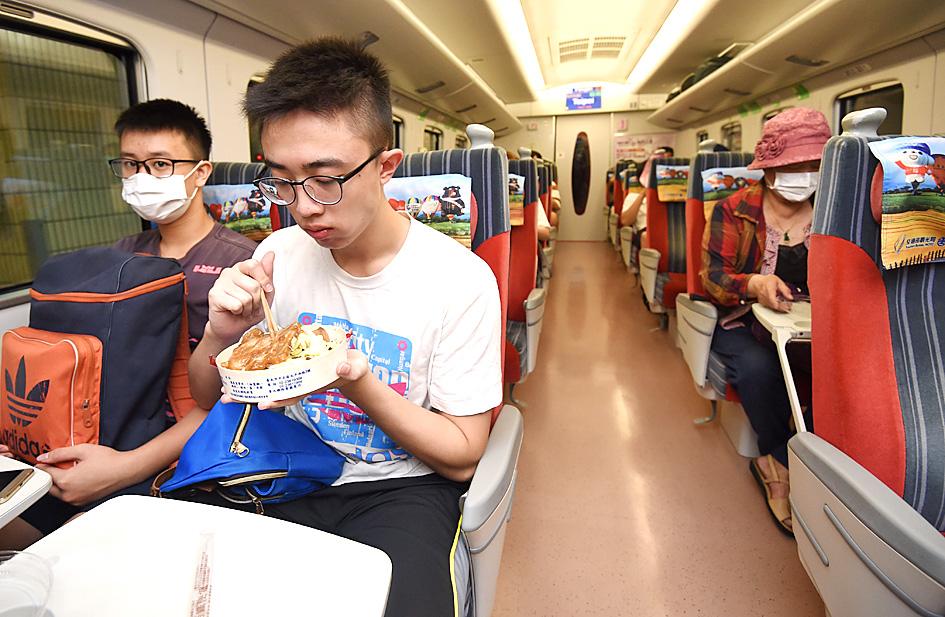The Taiwan Railways Administration (TRA) yesterday prepared 18,000 boxed meals to be sold on trains and railway stations nationwide after the Central Epidemic Command Center (CECC) lifted a ban on eating and drinking on trains as the local COVID-19 outbreak eases.
Passengers on trains operated by the TRA and Taiwan High Speed Rail Corp (THSRC, 台灣高鐵) are allowed to consume food and beverages, provided that adjacent passengers do not eat meals at the same time, according to the center’s new policy, which took effect yesterday.
The TRA said it sold an average of 28,000 boxed meals per day before the COVID-19 pandemic, adding that daily sales fell to 11,000 in April, but has since Monday last week rebounded to 15,000.

Photo: Chien Jung-fong, Taipei Times
Passengers on TRA and THSRC trains still need to have their temperatures measured before entering stations. Wearing masks remains mandatory when social distancing guidelines requiring 1.5m between passengers cannot be observed on trains.
The TRA may sell no more than 120 standing tickets for each express train service, while THSRC can again sell tickets for non-reserved seats.
The two operators can now sell food, snacks, beverages, newspapers and souvenirs onboard, which was previously banned in accordance with the government’s disease-prevention policy.
Water dispensers at high-speed rail stations are also to be reopened.
The TRA and THSRC said their systems were operating normally yesterday.
There were isolated incidents of passengers not wearing masks at Taipei Railway Station, as they thought this was not mandatory anymore under the new policy when accessing the public transport system, although a majority of passengers are now used to wearing masks, the station said.
The Ministry of Transportation and Communications has also relaxed some restrictions for public facilities.
Access to freeway rest areas, national scenic areas and amusement parks is not restricted anymore, the ministry said.
Wearing masks is not mandatory inside post offices if social distancing guidelines can be observed, it added.

Right-wing political scientist Laura Fernandez on Sunday won Costa Rica’s presidential election by a landslide, after promising to crack down on rising violence linked to the cocaine trade. Fernandez’s nearest rival, economist Alvaro Ramos, conceded defeat as results showed the ruling party far exceeding the threshold of 40 percent needed to avoid a runoff. With 94 percent of polling stations counted, the political heir of outgoing Costa Rican President Rodrigo Chaves had captured 48.3 percent of the vote compared with Ramos’ 33.4 percent, the Supreme Electoral Tribunal said. As soon as the first results were announced, members of Fernandez’s Sovereign People’s Party

MORE RESPONSIBILITY: Draftees would be expected to fight alongside professional soldiers, likely requiring the transformation of some training brigades into combat units The armed forces are to start incorporating new conscripts into combined arms brigades this year to enhance combat readiness, the Executive Yuan’s latest policy report said. The new policy would affect Taiwanese men entering the military for their compulsory service, which was extended to one year under reforms by then-president Tsai Ing-wen (蔡英文) in 2022. The conscripts would be trained to operate machine guns, uncrewed aerial vehicles, anti-tank guided missile launchers and Stinger air defense systems, the report said, adding that the basic training would be lengthened to eight weeks. After basic training, conscripts would be sorted into infantry battalions that would take

GROWING AMBITIONS: The scale and tempo of the operations show that the Strait has become the core theater for China to expand its security interests, the report said Chinese military aircraft incursions around Taiwan have surged nearly 15-fold over the past five years, according to a report released yesterday by the Democratic Progressive Party’s (DPP) Department of China Affairs. Sorties in the Taiwan Strait were previously irregular, totaling 380 in 2020, but have since evolved into routine operations, the report showed. “This demonstrates that the Taiwan Strait has become both the starting point and testing ground for Beijing’s expansionist ambitions,” it said. Driven by military expansionism, China is systematically pursuing actions aimed at altering the regional “status quo,” the department said, adding that Taiwan represents the most critical link in China’s

‘REALLY PROUD’: Nvidia would not be possible without Taiwan, Huang said, adding that TSMC would be increasing its capacity by 100 percent Nvidia Corp CEO Jensen Huang (黃仁勳) on Saturday praised and lightly cajoled his major Taiwanese suppliers to produce more to help power strong demand for artificial intelligence (AI), capping a visit to the country of his birth, where he has been mobbed by adoring fans at every step. Speaking at an impromptu press conference in the rain outside a Taipei restaurant, where he had hosted suppliers for a “trillion-dollar dinner,” named after the market capitalization of those firms attending, Huang said this would be another good year for business. “TSMC needs to work very hard this year because I need a lot